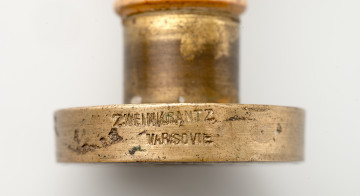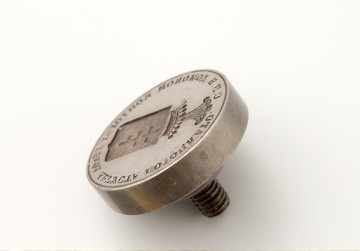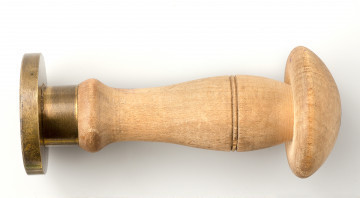
Seal matrix of the Church Administration of the Wilanów Parish
Museum of King Jan III's Palace at Wilanów
Part of the collection: Varia
In the collection of the Museum of King Jan III’s Palace at Wilanów, almost forty sphragistics pieces – seals or seal matrixes – have survived. The term ‘sphragistics’ is derived from the Greek word ‘sphragis’ standing for a seal (alternatively called sigillography after the Latin word ‘sigillum’) and defines the branch of auxiliary historical sciences where research focuses on interpreting the meaning of seals and determining the circumstances of their creation. The history of sphragistics dates back to the 19th century; at that time, it was noticed that seals could serve as a valuable source material contributing knowledge on political, heraldic and diplomacy arrangements as well as other motifs concerning the past.
The set of seals and seal matrixes preserved in the collection of the Museum dates back to the 18th century. Seals and matrixes are connected not only with the Wilanów estate. The set contains objects that can be associated with specific persons – the owners of Wilanów in the context of posts held by them, but also objects that document the system of administering estates and their functioning, not only the Wilanów estate.
The seal matrix shown here was used for making impressions in ink. The brass part on which the impressed image is located is round and concavely engraved, which means that the impressed image was cut on a flat part into the surface. In the seal field (the flat part in which the impressed image was engraved), there is a representation of the coat of arms of Congress Poland, which consists of a two-headed eagle holding a sword, a sceptre and an apple in its claws, on whose chest we can see an oval escutcheon with the White Eagle against the background of a coat lined with ermine fur under the closed crown. Over the crowns of the two-headed eagle, there is an imperial crown. On the surround, around the escutcheon, there is a circumscription in Polish: GREAT MASTER OF THE HORSE OF CONGRESS POLAND. This post was held by Aleksander Potocki (1778–1845), son of Stanisław Kostka and Aleksandra née Lubomirska, the owner of Wilanów from 1831. Aleksander was particularly engaged in the issues of horse breeding in Poland. He was nominated Master of the Horse of the Crown in 1815 and led the stable of government horses created with his participation in Janów Podlaski in 1819–1832.
Author / creator
Dimensions
entire object: height: 1,9 cm, width: 3,5 cm
Technique
carving
Material
brass
Owner
Museum of King Jan III's Palace at Wilanów
Identification number
Location / status

Museum of King Jan III's Palace at Wilanów

Museum of King Jan III's Palace at Wilanów

Museum of King Jan III's Palace at Wilanów
DISCOVER this TOPIC
Museum of King Jan III's Palace at Wilanów
DISCOVER this PATH
Educational path